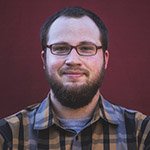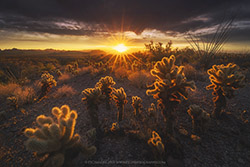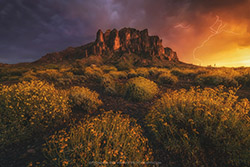
|
|
|||||
|
Featured Photographer, November 2015: Peter Coskun
We want to thank Peter Coskun, our featured guest photographer for November, for his time and willingness to share his wonderful photography with us! Please visit his links to see more of his work, and to let him know you enjoyed this interview. :: You moved to Arizona at a young age, and didn't start photography until high school. I imagine a move like that would be strange for someone young. Did you hate the desert initially? What eventually helped you find the beauty in it? Growing up on the east coast (Philadelphia), you always think that the desert is just a flat boring landscape with nothing of interest for miles upon miles. Of course, in movies that's what they sort of make it out to be. I never thought my family would move across the country, let alone to the desert, but it seemed to work out in the long run. I remember the flight we took to get from Philadelphia to our new home. It was in late November and I had just started my freshman year of high school. Back east, it's usually already in the 30s or 40s around that time, so of course we had bundled up before the flight. When we landed in Phoenix it was over 80 degrees (in late November!). We got some strange looks, as we were all in our winter attire. Everything was foreign to me, the landscape, the people, the overall atmosphere. It was the first time I had ever seen mountains and cacti. I didn't necessarily hate the desert at first, I just didn't find it comfortable, since it was such a huge change and a landscape I was not used to. It took a few years until I made some good friends and got a BMX bike (something I could never have back east). We would ride around in the desert, and it just became so peaceful to be outside that I slowly began to enjoy my surroundings. When I was a junior in high school I took a photography class and really didn't think much of it at the time. It was fun, and it was different. I've always been a creative person, so I guess it just came natural to me (I passed with an A+). It wasn't until I was almost 20 that an itch to take photos came into play (again, after taking a digital photography course in college). Once I
got my first dSLR, I was hooked. I was photographing everything, but sure
enough, it was the nature that caught my interest. Wildlife, landscapes, if
it was outside and didn't involve man made elements, I tried to photograph
it.
:: You mention in your bio that you have received critiques from some pretty big names in photography, are these photographers you sought out? You also mention that some of the critiques were not favorable for one looking to have a career in photography. What were some of these critiques, and how did you handle the news…and did you entirely agree with them? When I first began taking photos of nature and landscapes, I had been posting them on a site called DeviantART. There was a pretty decent group of photographers who enjoyed the same styles, and often we would critique the work of one another. A little later I found out about a site called NPN (naturephotographers.net). I was able to lurk around that site and see the type of work that was posted and the photographers who posted them. After months of debate, I caved in and purchased a membership plan so I too could post my work for critique. Some of the big names that I noticed were the likes of Marc Adamus and Guy Tal, two photographers who I had found on DeviantART that I immediately connected with their work. On a few occasions, they would post their critique on my images over there, which I definitely took to heart. They were never anything really negative, more so obvious things that I now would realize before even posting an image somewhere (mild distortion, emphasizing specific elements within a scene, etc.). There were plenty of other photographers on the site who helped pave
the way for me and my work, and my time on NPN was well worth it. There is
now a small tight knit group of photographers I can relay an image to for
real honest critique as well, and some of it has been just that. Very
honest and blunt. If the image is garbage, they are not afraid to tell you,
and I have had a few images that have been such which never will see the
light of day. This type of critique can definitely deter a photographer
looking to keep on pursuing their passion. I don't let such things get to
me. I look up to and respect these other photographers, and their critiques
too have been just as valuable and maybe even more than my time on NPN. In
the end, I feel it helps you become a stronger photographer and makes me
want to work even harder on that next image.
:: The focal point of your work is the western U.S., more specifically, the southwest, which has become SUCH a hotspot for photography. Does its popularity ever sour your desire to go out and capture it? How do you keep that subject, that is YOUR backyard, fresh and exciting? I always find it interesting that the SW is one of the hotspots for photography, yet so much of it is relatively unexplored by photographers. I mostly see images from the sandstone regions of the desert that have become so popular over the years. I'm lucky that I live in one of the most diverse areas of the desert, the Sonoran desert. It seems most locals tend to enjoy photography in this part of the SW, and you hardly ever see the big names on social media make it out that way. It almost feels like it's my place and that I can be as creative as I want. It's such a vast area of mountains and cactus-filled foothills. I know recently there has been more interest in some of the bigger names and those who follow to come out to the Sonoran desert. I can't blame them when we have places like the Superstition mountains and the KOFA mountains. Those two areas are slowly becoming hotspots for the SW. Conditions always change, especially with the seasons. Some think it's
the same all year long, but there are pockets of the desert here that get
fall colors and vibrant wildflower blooms. It even snows in the
Superstition mountains sometimes. For me, there is always something to
explore, even if it is a location I have been to dozens of times. I enjoy
photographing unique conditions over those often visited landscapes.
:: Living in the southwest and shooting some of the wonderful native lands, I'm curious your opinions on the way some of these locations are being managed when it comes to photographers looking to acquire images? Do you like the current structures in place, or what would you change if you could? I think it can be a real gray area for photographers in those parts
of the SW. They have permits in place for those wanting to photograph on
native lands, however, they can often be ignored despite having paid for
them. A lot of it has to do with a respect for the people that live on
those lands. I haven't ventured too much on native lands yet because I
never found a good way to approach making a good connection. There have
been horror stories of people trespassing and having their vehicles
damaged, vandalized, or even towed without warning. When photographers keep
on trespassing, the natives lose respect and no longer want those people on
their property. It can also be difficult to get permission to visit
specific areas because so much of it depends on finding the rightful land
owner to that specific spot. I'm not sure how I would change it or what can
be done, but I do think a large part of it has to do with respect for the
people and their landscape.
:: What's your favorite piece of non-photographic equipment? Wet wipes, or any type cleansing wipe. They really make you feel a little more
fresh after a few days on the road.
:: What's the scariest thing that's happened to you while photographing? I've never had any truly scary things happen to me
fortunately, but there have been a few times I have felt pretty uneasy
about my decisions at the time. One would be hiking to hidden lake in
Glacier National Park in complete fog alone with grizzly bear warnings.
Didn't see any bears, but had a few large rams jump out right in front of
me where a section of the trail curves and is hidden behind a small slope.
Also standing outside during the middle of a crazy lightning storm in the
superstition mountains. I was not prepared and had lightning bolts crashing
in every direction. Not the kind of place you want to be during a storm
might I add.
:: What's the most common mistake you see photographers make, and what's the most common mistake you still find you make when shooting? Probably choosing the wrong settings for a particular image like too high
of an ISO speed, too short of a shutter speed, wrong aperture, etc. Which
are mistakes I still sometimes make. I see images where it looks fantastic
in a small web preview, but the the overall image looks slightly out of
focus, or too noisy or the colors are just all over the place. Exposing
correctly is also something I see people miss, including myself. Nobody is
perfect and we all make mistakes from time to time. My mistakes usually
occur when I am so focused on what is actually going on in the scene or I
am just way too excited about the scene I am photographing and am totally
oblivious to what the settings I had were.
:: Social Media has played an important part in your photography I'm sure, but what drawbacks or negatives do you think Social Media platforms have for the medium? Social media is surely a double edged sword. It can be
an amazing tool in getting your work recognized by the masses, but it also
can put your work in the wrong hands. I always try to be positive in that
every time I post something I think of the possibilities of sales,
networking with the right photographers or businesses, and the overall
response to an image hoping that images are received well by the general
public. Obviously, I shoot for myself first and foremost, but now that I am
starting to grow on the business side, I have to consider these things. Of
course in the back of my mind there is the thought of image theft, but I
haven't had too many bad experiences there (although I am sure if I spent a
good chunk of time looking I'd find a few).
:: What advice would you pass on to a new photographer looking to get into nature photography? Explore the landscape around you, don't just look
at the big pictures, look down and see the small pictures as well.
Photograph what you enjoy, don't photograph something because someone else
has photographed it. Photograph it because you want to. Also, don't assume
it is a life of luxury. It is certainly not, although it can be if you
really work at it.
:: What aspects of outdoor photography drive you the most crazy? Probably the fact that it can be so difficult to judge what is going to
happen with the light at sunrise or sunset. Often times it looks like the
sky is going to explode, and you get excited only to have the sky turn
gray. Or, it looks so bad you decide not to go out and miss some incredible
light (both of these happen to me all the time). You just never really know
what is going to happen. There are some apps now that are being developed
to predict such things, but you just never know unless you are there.
:: What plans do you have in the next several months for photography that you are excited about? Any other projects you're looking forward to? Hopefully I will finally be able to run a few workshops here in Arizona and
be able to grow and expand into more areas around the west. Other than
that, I also hope I can visit some areas outside the U.S. next year and
expand my portfolio with images of places that very few have been to or
photographed.
:: You have a lot of great shots with the cholla cactus; ever have any mishaps with those demon shrubs? The deceiving teddy bear cholla is one of my favorite desert subjects to photograph. They just catch light like nothing else and have this glow to them that makes for beautiful photography. Of course, having been around them numerous times I have had
some accidents. Not nearly as bad as some people I know, but I have had
some of those nasty needles go through my boots and into my feet, among
other places. They are not to be mistreated as they will make you pay, but
there are ways to easily rid of those small chunks that like to "jump" at
you. Best to keep a comb with you to pull them out. Tweezers are nice to
have as well for any needles that get really jammed in there.
:: How concerned with getting the image right in the field are you, or are you more of a fix it all in post type of shooter? What's your stance on post processing and how much is too much? I try to get it as close to how it looked in person first and then fine tune it to make it my own. I do think post processing is a big part of photography today regardless of what people say. I get a lot of people who criticize my work because it looks too photoshopped, or that's clearly not how it looked in person. A lot of these people weren't there when I was taking the photo, so they don't really know if that was how it is or if it was photoshopped. Cameras can record things our eyes cannot see, like star trails and streaking clouds during long exposures. In reality, my processing is quite minimal. Sure, I
blend images together for things like dynamic ranger or depth of field. Or
adding the moon to a night or twilight scene so it appears as close to how
I saw it to the naked eye as I remembered. If it wasn't there to begin
with, I don't add it in. I think processing helps give one a style to
differentiate themselves from the masses. I don't think I do anything
really elaborate with my images, I just want them to look the way I want
them to look. I've always enjoyed that dreamy look to an image, but knowing
it's still possible to see that it looked like that in real life.
:: What aspect of where photography is headed excites you the most, and what terrifies you? I think what still excites me about photography is that there is always something new and fresh to photograph. There is a whole world out there, and still much of it has never been touched (which is probably a good thing), but I always think of the possibilities of venturing to a place that nobody has been and exploring something completely new. I think what terrifies me, is that with the evolution of
gear, things will get too easy and the art of making a photograph will be
lost. I fear the day that the iPhone or smartphones in general are
considered actual cameras. I know the technology is there and that they can
produce magnificent images, but I would hate to see the traditional camera
body and lens combination be lost. I can't imagine seeing hundreds of
tripods set up at delicate arch or any other spot with smartphones and L
brackets attached to them.
:: When it comes to print sales, It seems that the general public is often hardened to buying art these days, especially when it comes to photography. How do you combat that mentality? Trying to sell a print is one of the hardest things to do. I personally always felt that if you truly loved an image or piece of art, you would pay what the seller is asking regardless of how steep the price is. You have to love an image to even want to consider hanging it up on a wall somewhere. I've been lucky to sell a number of prints through my website, as well as Fine Art America, but you just have to think that there is at least one person who might connect with your images who would consider purchasing one. I don't expect to sell hundreds of prints a week, although that would be amazing, but when I see an order for an image that I personally have a connection with, that feeling goes a long way to being confident in your work. There are still those who feel photography is not an art, yet, I see more art galleries displaying photography. If you don't have the work to sell, nobody can purchase it, but if you have a handful of images to show, you have the potential to sell any of those images. Sometimes I am surprised at some of the images people have chosen to purchase from me, but I always think if it wasn't available, I wouldn't have had that sale. You just never know who will buy your work, but as long as it is available, there is potential. |
"Explore the landscape around you, don't just look
at the big pictures, look down and see the small pictures as well."
Photographer Spotlight Interviews
|
|
 |
Other Cool Stuff→ Past Workshop Photos → 72dpi.com → How-To Articles → Photographer of the Month |
 |
Contact Us→ Contact Us → About Us → Site Map |
© 2009-2024 Aperture Academy, Inc.









